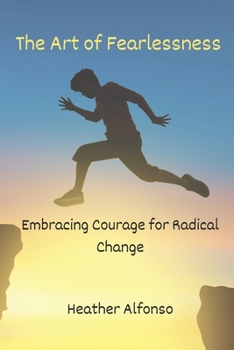The Art of Fearlessness: Embracing Courage for Radical Change
Select Format
Select Condition 
Book Overview
In "The Art of Fearlessness," embark on a transformative journey that transcends the boundaries of fear and ushers you into the realm of radical change. This captivating book, authored by Heather Alfonso, is a beacon of inspiration for those seeking courage in the face of uncertainty.
Within these pages, discover the profound artistry of fearlessness and how it can be harnessed as a powerful catalyst for personal and societal transformation. Drawing upon a rich tapestry of real-life stories, psychological insights, and practical wisdom, Heather masterfully guides readers through the process of embracing courage to effect meaningful change in their lives.
The book is a roadmap to self-discovery, offering actionable strategies to overcome fear and cultivate resilience. Through thought-provoking exercises and introspective reflections, readers will learn to navigate the unknown with grace, unlocking their full potential.
Whether you are facing a career transition, contemplating a major life decision, or yearning for personal growth, "The Art of Fearlessness" empowers you to confront your fears head-on and emerge stronger on the other side. Heather's compassionate narrative invites readers to embrace vulnerability as a source of strength, fostering a mindset that emboldens them to create positive, lasting change.
This book is not just a guide; it's a call to action. As you delve into the pages of "The Art of Fearlessness," you'll be inspired to break free from the shackles of fear and step into the uncharted territories of your own potential. If you're ready to embark on a transformative journey towards radical change, this book is your indispensable companion.
"The Art of Fearlessness" is not just a book; it's a revolution waiting to unfold within you. Embrace courage, defy fear, and unleash the radical change you've been longing for. Your fearless journey starts here.





















